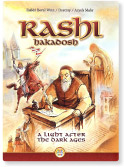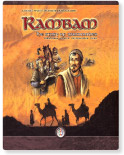Previews & samples of the educators guide
Audience responses
The audience at the Los Angeles Premiere, absolutely adored the film. Mazel tov – a great job.”
Robert J. Avrech – Rambam Writer, Seraphic Press
“Thank you for the incredible “Rambam” premieres we held throughout South Africa. We have had overwhelmingly positive responses from around the country. I personally saw the film six times and I can’t get it off my mind and am constantly inspired by it. “No time to lose.” Continue with your incredible work.”
Rabbi Lawrence Perez – Mizrachi South Africa
“The Rambam film and children’s’ books, in Hebrew, are outstanding! We encourage you to have the Educators’ Guides, and all of Destiny’s educational materials, translated into Hebrew so we can hold seminars, for teachers to use Destiny’s programming, not only locally, but throughout Israel.”
Rabbi Nosson Kohn – Belev Echad, Beit Shemesh Rural Communities, Israel
“I will never think of the Rambam in the same way. He’s now a living breathing human being.”
A prominent Rosh Yeshiva – Los Angeles
“I never thought about all the tragedy in Rambam’s life. Seeing all he went through, well, it just makes me realize what a Gadol he was. I always knew it, but now I really know it.”
Rosh Yeshiva’s wife – Los Angeles
FILM SYNOPSIS
Rambam: The Story of Maimonides provides a behind – the – scenes look at the life of one of Judaism’s most influential scholars. In addition to being a leading codifier of Jewish law and a Talmudic commentator, Rambam was also a scholar of the natural sciences. He studied medicine, astronomy and mathematics. His mastery of these fields, together with his avid interest in healing, led him to become a noted physician. Rambam’s knowledge of both the natural world and the Torah world enabled him to offer unique contributions to Jewish philosophy, such as his “Moreh Nevuchim, Guide to the Perplexed”. Till today, he is viewed as a founding father of Jewish thought.
Born in 1135 in Cordoba, Spain, Moses (Moshe) ben Maimon developed his love for learning at an early age. His father, Rabbi Maimon, a student of Rabbi Josheph ibn Migash, taught him Torah – as well as science and mathematics.
When Rambam was only 13, the radical Almohad Muslim sect took control of Cordoba. Rabbi Maimon and his family fled to the mountains and caves of Christian Spain. After wandering for many years, they left for Fez, Morocco. Not long after they arrived, the fanatic Almohads invaded Morocco. Anyone caught observing Judaism and refusing to convert to Islam, were publicly executed by them.

Forced to flee yet again, Rambam and his family set sail for Eretz Yisrael. Arriving in 1165 at the port of Acco, they found it to be unsafe for the Jews – as the Christian Crusaders dominated the Holy Land.
Rambam, faced with this reality, and the death of his father Rav Maimon, decided within in the same year, to move to Fostat (old Cairo) in Egypt. There, the Rambam confronted the Karaites, a sect of Jews that only followed the Written Law – and mistakenly rejected the Oral Law. Unfortunately, soon after their arrival in Egypt, Rambam’s wife and daughter died of the plague.
There, burying himself in his work, Rambam began to write the “Mishnah Torah”, his systematic, and monumental, code of Jewish law.
Rambam remarried and began to rebuild his life. David, Rambam’s younger brother, supported the family by trading gems overseas. While Rambam was busy writing his commentaries, another tragedy struck – David died when his ship sank in the Indian Ocean, and the family’s entire fortune was lost.
Rambam was now forced to provide support for both his and his brother’s family. Although he was offered the position of Chief Rabbi of Fostat, he became a doctor. He was against the idea of earning a livelihood through the rabbinate. However, understanding the needs of the community, he did voluntarily become the spiritual leader of the Jews of Egypt.
Rambam became so well known as a healer, that he was appointed to be the personal physician to Saladin, Sultan of Egypt. Overcoming the jealousy of the court physicians, he earned the trust and support of the Sultan. While in the royal court, Rambam used his influence to help the Egyptian Jewish community.
Despite his personal trials and tragedies, the film shows many scenes that illustrate Ramam’s overarching concern for the survival of the Jewish people.
While Rambam was in Fez, Morocco, he composed a letter “Iggeret HaShmad”, regarding forced conversions. He was concerned that many Jews allowed themselves to be killed – instead of saying they believed in the Muslim faith and Allah. He held the value of life as foremost – teaching the community to state they believe in Allah – while meaning otherwise in their hearts – so that they should remain alive.
Another example of Rambam’s concern for the Jewish people occurred while Rambam was living in Egypt. He appealed to the Sultan, Saladin to withdraw life threatening decrees against Jews of Yemen. He write, “Iggeret Teiman – a Letter to Yemen” to inspire and encourage the Jews of Yemen to keep their faith, and not give up hope. The decrees were annulled – and the Jews of Yemen were saved.
Closer to home, he realized how little the Jewish community of Cairo knew about properly observing Jewsih law – specifically family purity. He began to teach. Encouraged by the response, especially by the women of Fostat, Rambam was inspired to write his famous “Sefer HaMitzvot” – to explain the Torah’s commandments on how to live a proper, and fulfilling, Jewish life.
Throughout the film the Inkman appears as a friend and confidante to Rambam. The Inkman is a fictitious figure, based on Eliyahu HaNavi – the prophet who never died. The Inkman has a similar relationship with Rambam as he did with Rashi in the film.
Towards the end of his life, Rambam’s health succumbed to the pressures of his medical practice, writing his commentaries, and leading the Jewish community of Egypt. When he died in 1204, both Jews and non-Jews in Cairo mourned for him. His influence, however, reached far beyond the borders of Egypt. His greatness was so well known that Jews all over the world recognized that, from Moshe to Moshe, none arose like Moshe. (From Moshe Rabbeinu, ….. none arose like Moshe ben Maimon).
He was buried next to his father, Rabbi Maimon, in Tiberius, Israel.






